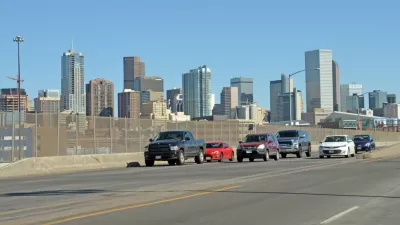Emily Badger reports on the growing importance of the cellular phone, and particularly their location tracking capabilities, as the next most essential transportation planning tool.
While the concept of having your every movement tracked and analyzed by transportation experts may seem like a profound privacy intrusion to many, cellular providers are functionally able to acquire such data right now without explicit permission, and without requiring you to have GPS enabled. As Badger reports, network signaling data can be used to triangulate locations to within 50 meters in dense urban areas. And the only thing keeping cell carriers from exploiting this information is that they hadn't yet figured out they could monetize it for use by transportation planners.
But that is changing. In North Carolina, the Capital Area Metropolitan Planning Organization (MPO) is working with AirSage, a company that contracts with cell phone carriers to produce analytical data of use to transportation planners, to conduct an origin-destination study of travel patterns and to measure traffic speeds in their region.
According to Kyle Ward, a transportation engineer with the MPO, "'I personally am still struggling with ‘how do I get this all implemented in transportation?'...So I've only done some thinking in the shower about 'wow, I wonder what else we could do with this.' But I think the more people who realize what's happening, you'll get tons of people thinking about it, and lots of ideas will come out.'"
FULL STORY: You Already Own the Next Most Important Transportation Planning Tool

Alabama: Trump Terminates Settlements for Black Communities Harmed By Raw Sewage
Trump deemed the landmark civil rights agreement “illegal DEI and environmental justice policy.”

Planetizen Federal Action Tracker
A weekly monitor of how Trump’s orders and actions are impacting planners and planning in America.

The 120 Year Old Tiny Home Villages That Sheltered San Francisco’s Earthquake Refugees
More than a century ago, San Francisco mobilized to house thousands of residents displaced by the 1906 earthquake. Could their strategy offer a model for the present?

In Both Crashes and Crime, Public Transportation is Far Safer than Driving
Contrary to popular assumptions, public transportation has far lower crash and crime rates than automobile travel. For safer communities, improve and encourage transit travel.

Report: Zoning Reforms Should Complement Nashville’s Ambitious Transit Plan
Without reform, restrictive zoning codes will limit the impact of the city’s planned transit expansion and could exclude some of the residents who depend on transit the most.

Judge Orders Release of Frozen IRA, IIJA Funding
The decision is a victory for environmental groups who charged that freezing funds for critical infrastructure and disaster response programs caused “real and irreparable harm” to communities.
Urban Design for Planners 1: Software Tools
This six-course series explores essential urban design concepts using open source software and equips planners with the tools they need to participate fully in the urban design process.
Planning for Universal Design
Learn the tools for implementing Universal Design in planning regulations.
Clanton & Associates, Inc.
Jessamine County Fiscal Court
Institute for Housing and Urban Development Studies (IHS)
City of Grandview
Harvard GSD Executive Education
Toledo-Lucas County Plan Commissions
Salt Lake City
NYU Wagner Graduate School of Public Service





























